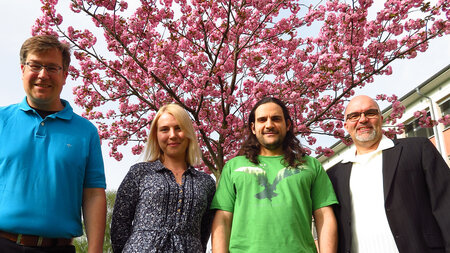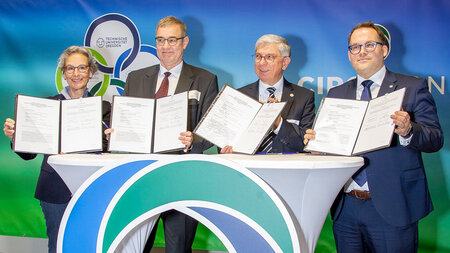More than the Current Mainstream
Eleven Questions for Prof. Dr. Jochen Hartwig, who has held the Professorship of Economic Policy since February 2016
Prof. Dr. Jochen Hartwig (46) has held the Professorship of Economic Policy within the Faculty of Economics and Business Administration since February 2016. In eleven answers, he gives “University News” readers a glimpse into his background, his goals and his time in Chemnitz.
What does it mean to specialize in Economic Policy?
Alongside Economic Theory, the subject of Economic Policy is the second major branch of economics. On the one hand, it deals with further refining the knowledge acquired through economic theory and developing this for political consulting. On the other hand, it analyzes the actions of economic actors. Along with general, comprehensive questions, the field covers a large number of distinct domains. These include, among others, competition policy, stabilization policy, growth policy, development policy, foreign trade policy, monetary policy, social policy and fiscal policy.
The TU Chemnitz is the right choice for me as a professor, because ...
…the conditions for research and teaching are excellent and I have many colleagues in the faculty here who share my research interests. This results in opportunities for productive cooperation over the next years.
Can you tell us a bit about your academic career so far?
I studied Economics and History at the Carl von Ossietzky University of Oldenburg, where I completed my doctorate in 2001. I was a research assistant from 1998 to 2003 and until 2007 I was a lecturer at the University of St. Gallen. Beginning in 2001, I worked in various capacities at KOF Swiss Economic Institute at the ETH Zurich, most recently as the head of the section International Business Cycles. At the ETH, I received the Venia legendi in 2010 for Applied Macroeconomics and Economic Policy. I have been a professor in Chemnitz since February. I’ve known the TU since the 2010/2011 winter semester, when I stood in for the Professorship of Macroeconomics.
Describe your years of study in only a few words.
I was able to get involved with interesting topics and made good friends. It was great.
Did you have role models during your studies who encouraged you to pursue a scientific career?
I had one mentor: Dr. Klaus Köster, who unfortunately passed away recently. He sparked my interest in the history of economic schools of thought and showed me that there is more to discover in the field of Economics than just the current mainstream.
Do you have any advice for young students and graduates?
Choose your field of study according to your preferences and not according to what “the market” supposedly demands. If you can’t get enthusiastic about your subject, you can’t become truly great in it either.
What would you like to achieve in your teachings in the future?
In teaching, I pursue an empirical, historical and critical approach. That means I strive to connect theories and models with empirical applications as well as concrete problems and impart knowledge about the evidence and institutional frameworks under which Economic Policy operates. Furthermore, I hope that students will understand that there is not just “the one” (correct) model in Economics. To achieve this, I confront mainstream theories with divergent viewpoints from classic or modern “heterodox” economists.
What impact does your research have at the TU Chemnitz?
My research emphases include business cycles, growth, structural change and income distribution. For example, I study whether tertiarization leads to a slowdown in economic growth or how a change in functional income distribution affects economic growth. These are empirical projects. A theoretical pet project of mine is Keynes’s “General Theory”. It is interesting because it makes an important contribution to our understanding of and ability to deal with recessions and financial crises, which unfortunately have become relevant again in the last few years. And there are many controversies surrounding it, which I hope to help resolve.
There are around 45,000 professors at German universities. What distinguishes you from all others?
There are few Keynes experts at German universities, and I am one.
What is your favorite place to show guests in Chemnitz?
I have not lived here long and don’t know the city very well yet. The Karl-Marx-Monument is an eye-catcher. And of course Kaßberg.
How do you play a part in the life of the city?
Up to now, primarily in campus life. Next, I would like to get involved in the Chemnitzer Wirtschaftswissenschaftlichen Gesellschaft economic society – and then we’ll have to see.
Mario Steinebach
10.06.2016






